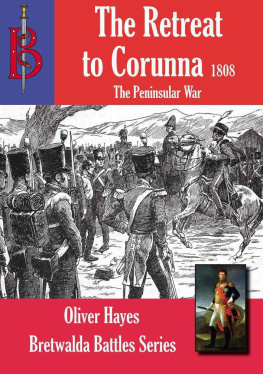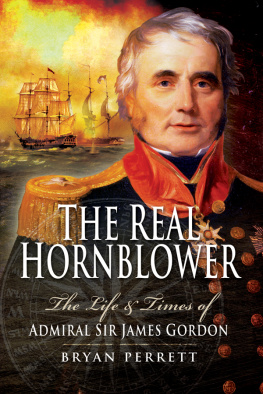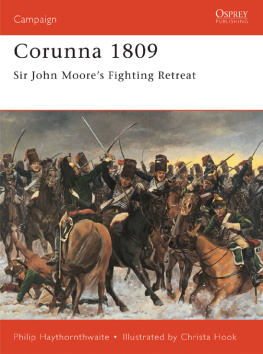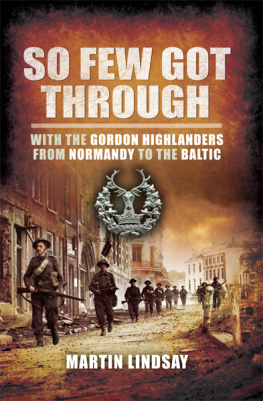DEDICATED
BY PERMISSION
TO THE
OFFICERS, NON-COMMISSIONED OFFICERS, AND
MEN OF THE 15TH (THE KING'S) HUSSARS
This edition is published by PICKLE PARTNERS PUBLISHING
Text originally published in 1913 under the same title.
Pickle Partners Publishing 2011, all rights reserved. No part of this publication may be reproduced, stored in a retrieval system or transmitted by any means, electrical, mechanical or otherwise without the written permission of the copyright holder.
Publishers Note
Although in most cases we have retained the Authors original spelling and grammar to authentically reproduce the work of the Author and the original intent of such material, some additional notes and clarifications have been added for the modern readers benefit.
Contents
INTRODUCTION
ALEXANDER GORDON, the writer of this journal, was born in 1781. He inherited the estate of Auchlunies and, subsequently, the estates of Ellon, in Aberdeenshire, from his father, the third Earl of Aberdeen, in succession to his half-brother, the Hon. William Gordon.
He was a pupil of the Rev. Sydney Smith. He entered the army in 1803, being on July 9 of that
year appointed Cornet in the 15th Light Dragoons, becoming Lieutenant on January 22, 1805. Just
three years later he obtained a company in the 3rd West India Regiment, which, however,
he probably never joined, as almost immediately on March 3, 1808he was reappointed to
a troop in his old regiment, now Hussars, with which he served during the campaign under
Sir John Moore. In March, 1811, Captain Gordon transferred to the 60th Foot, and retired
by the sale of his commission on October 17. In 1847 he was awarded the Peninsular Medal
with clasp for Sahagun.
He married in 1811 Albinia Louisa, daughter of Captain Richard Cumberland (a son of Richard
Cumberland the dramatist) and Lady Albinia, daughter of the third Earl of Buckinghamshire.
Captain Gordon was a J.P. and Deputy-Lieutenant for Aberdeenshire; he died in 1872.
His journal, now in the possession of his grandson, Mr. Arthur Gordon, C.M.G., of Ellon, seems to supply something that has up to the present time been wanting in the history of the Corunna campaign ; for though many diaries and journals have been published, they deal chiefly with the doings of the other arms, and we know but little of the work of the cavalry during the advance and
retreat. The story of hardship, gallantry, and privation here set down has the advantage of being related by an officer who belonged to an arm the discipline of which remained unimpaired, and to a Regiment which, throughout the retirement, was always with the rear-guard.
The maps are from sketches executed by Captain Gordon, and his portrait, which forms the frontispiece, is from a miniature by Andrew Robertson, now in the possession of the Hon. Mrs. Richard Cavendish Boyle, Captain Gordon's youngest daughter.
H. C. W.
September, 1913.
PREFACE
THE following narrative, comprising a journal of the disastrous campaign in Spain under Sir John Moore, was drawn up from notes taken on the spot, immediately after my return to England,
while the occurrences it relates were still fresh in my memory. The details refer chiefly to the
operations of my own corps, from which I was seldom absent; but during the retreat the troops
were so much concentrated that regimental officersthose of the cavalry, at leastenjoyed
opportunities of becoming acquainted with the situation and general movements of the army
superior to those afforded by staff appointments in ordinary cases.
Owing to the short period of our stay in the country; our continual moving, seldom remaining twenty-four hours in the same place; the gross ignorance of the people in general; and our imperfect knowledge of their language, which prevented a free communication with the few well-informed persons we were so fortunate as to meet withit was extremely difficult to obtain accurate information upon any subject. It is therefore by no means improbable that I may have been led into error occasionally in my remarks on the manners and customs of the Spaniards, or in the description of the places we visited; but I noted everything as it appeared to me at the time, and if there be mistakes in these pages, I trust they are neither numerous nor important.
A. G.
THE JOURNAL OF
A CAVALRY OFFICER IN THE CORUNNA CAMPAIGN
CHAPTER I
Departure from EnglandThe Voyage to Corunna DisembarkationCorunna in 1808The Place and the PeopleKing Joseph and King Ferdinand
[THE campaign of Vimiera was over; the French, hitherto invincible upon the Continent of Europe, had felt in the Peninsula the weight of the British arms, and had been no less surprised than demoralized. The agreement known as the Convention of Cintrabut which had been negotiated near Torres Vedras and signed at Lisbonhad been completed: Portugal was set free and its harbours secured as the base for future operations. The three British GeneralsSir Hew Dalrymple, Sir Harry Burrard, and Sir Arthur Wellesleywho had put their names to the Convention and to the armistice which had preceded it, had gone to England to answer for their actions before a court of inquiry, leaving in command of the British army in Portugal Sir John Moore, who had landed at Lisbon while the arrangements for the conclusion of the Convention were in progress.
Shortly before the British forces had arrived in the country, the Spaniards had defeated the French under Dupont at Baylen, when the whole population at once sprang to arms. The French army hurriedly retired behind the River Ebro, and the Spanish forces now reoccupied Madrid, and pushed forward three armies in Biscay, beyond Tudela, and into Aragon to oppose the French, to drive them from Spain, and even, as some boasted, to pursue them across the Pyrenees. So soon as the news of Duponts disaster reached Napoleon, he sent off reinforcements, and an amended scheme of operations to deal with the situation which had arisen; and finally, on October 30, 1808, he left Paris to take command in person of the army of 250,000 men now gathered in the Peninsula.
On October 6 despatches from England had reached Sir John Moore at Lisbon, informing him
of his appointment to the chief command of the army to be employed in Spain an army which, with a force still to sail from Falmouth to Corunna, would comprise some 40,000 men. Sir John Moore's
natural exultation at his good fortune finds expression in his diary, wherein, under date of
October 14, he writes: "There has been no such command since Marlborough for a British officer"
The original object with which the British expeditionary force had been sent to the Peninsula
the expulsion of the French from Portugalhad been achieved by Wellesleys victories and by the fulfilment of the terms of the Convention of Cintra; but there had been considerable uncertainty among the Ministers at home as to the direction which any future operations should take, and while Dalrymple was in chief command he had been asked to forward suggestions as to where and in what manner an army of 30,000 or 40,000 men could most profitably be employed. Two plans finally assumed prominence: either that the British should advance across the frontiers of Portugal into Spain, and, in combination with the Spanish forces, attack the French immediately in their front; or that they should re-embark, proceed to Asturias by sea, and assail the French armies in flank and rear. Finally, on September 25, it had been decided that the whole of the British army then in Portugal should act in co-operation with the Spanish forces in the North of Spain for the expulsion of the French; and it was left to Moore, when the command of the British army was ultimately confided to him, either to embark his troops and go to Corunna by sea, or to march them by land from Lisbon to Valladolid, where he hoped to effect the junction of all his forces He decided to move by land for the reasons given in his diaryviz., that "the passage by sea is precarious, an embarkation unhinges, and when I get to Corunna I should still have to equip the army before I could stir, and in Galicia it might have been impossible to have found sufficient means of carriage."










